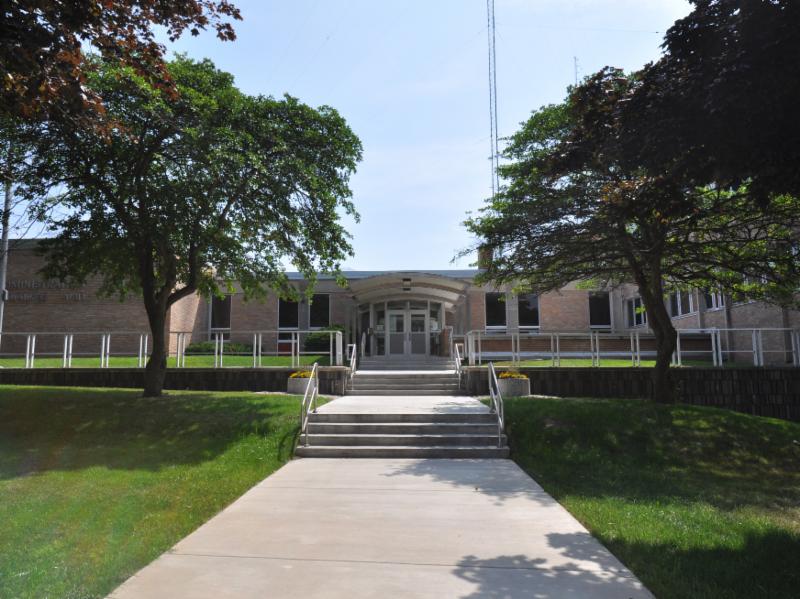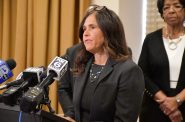Goodbye Columbus
And hello Cuba. MPS replaces Columbus Day with Indigenous Peoples’ Day.

Milwaukee Public Schools Office of School Administration, 5225 W. Vliet St. Photo courtesy of Milwaukee Public Schools.
Indigenous Peoples’ Day will be celebrated on the second Monday in October, replacing Columbus Day in the Milwaukee Public Schools. The change came via a resolution authored by school board directors Megan O’Halloran and Bob Peterson and passed by the Milwaukee School Board in September 2020.
Peterson is one of the founders of the progressive educational publication, Rethinking Schools. It published the book, Rethinking Columbus, which became an instant best seller starting in the early 90s. It outlined how Christopher Columbus was not a heroic explorer, but rather an exploiter of the riches in the New World, killing and enslaving the peoples of the Caribbean. Given that much of the “rethinking” started in Milwaukee, and that many school districts around the country have already established Indigenous Peoples’ Day, it is surprising that it took so long for MPS to come to this resolution.
On February 11, 2021, a committee of the board examined the MPS administration efforts to support First Nation students and strengthen implementation of First Nation studies in the school system.
A survey of 91 MPS First Nation parents, students, teachers and community members showed that a small majority felt their social and academic needs were being met, but much more had to be done to educate the larger school community on the history, culture and concerns of Native peoples.
Peterson noted that, while 60% perceived that their needs were being met, 40% First Nation individuals did not. Richanda E. Kequatosh, MPS First Nation Studies Coordinator, says that there is still a lot of mistrust with the Milwaukee system going back to the abuses in the Indian boarding schools.
The MPS board action calls for using the October date to promote a better understanding of Indigenous people in Wisconsin through the MPS programs. Wisconsin law, ACT 31, requires instruction in Wisconsin schools on the history and culture of Native Wisconsin peoples, but statewide the law is rarely enforced and no data is collected on its implementation.
Peterson points out that the money funding the district’s Native American Studies Program comes from the federal government to support Native students. Few funds are directed at educating the entire school community. That is one reason that Peterson is calling for another teacher and two paraprofessionals to work with Native students spread across the district and help implement ACT 31. More resources and training for teachers are in development.
During an interview, Peterson wanted to quickly pivot to another resolution he is cosponsoring with Director Tony Baez. It calls for the Biden administration to normalize relations with Cuba. The resolution notes that Cuba has prioritized education and universal healthcare.
Baez has tried to keep up with education in Cuba, but it has been difficult to go back because of the previous administration’s Cuban policies. Whatever one might think about Cuba’s political and economic systems, Baez says it is hard to question their success in healthcare and education. Cuban teachers have made presentations to Milwaukee teachers and families in the past. “Cuba is ahead of the United States in STEM education by 20 or 30 years, a leader in project-based education,” says Baez.
Peterson points to another feature of Cuban education: classes are kept to 20 students.
To those who might question the school board’s interests, Peterson is unapologetic: “We are a progressive school board.”
If you think stories like this are important, become a member of Urban Milwaukee and help support real, independent journalism. Plus you get some cool added benefits.
Political Contributions Tracker
Displaying political contributions between people mentioned in this story. Learn more.
- January 24, 2019 - Bob Peterson received $25 from Megan O’Halloran
- November 29, 2018 - Bob Peterson received $50 from Tony Baez
- August 26, 2018 - Bob Peterson received $50 from Tony Baez
- August 26, 2018 - Bob Peterson received $20 from Megan O’Halloran
K-12 Education
-
MPS Training in Science of Reading Going Poorly
 Nov 23rd, 2025 by Terry Falk
Nov 23rd, 2025 by Terry Falk
-
The Fear Factor at MPS
 Nov 11th, 2025 by Terry Falk
Nov 11th, 2025 by Terry Falk
-
MPS Reaching Out to Community
 Nov 2nd, 2025 by Terry Falk
Nov 2nd, 2025 by Terry Falk





















